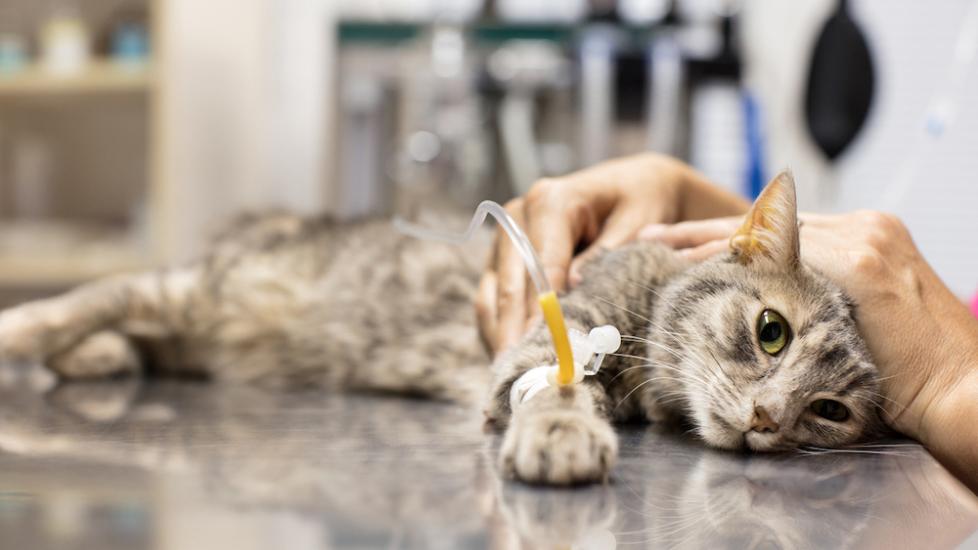Liver Inflammation (Hepatitis) in Cats
What Is Liver Inflammation (Hepatitis) in Cats?
Liver inflammation in cats can be confusing for pet parents, mostly because there are different terms thrown around when discussing this condition. The reason there are so many terms centers around the fact that more than the liver is involved.
Inflammation of the liver is also known as hepatitis, and it is much more common in dogs than in cats. Cats more commonly get inflammation of the liver, the gallbladder, and the bile ducts at the same time, a condition called cholangiohepatitis. Alternatively, they get inflammation of the bile ducts by themselves, known as cholangitis. Because these diseases of the liver, gallbladder, and bile ducts are so similar in how they affect cats, they are often grouped together and called cholangitis-cholangiohepatitis syndrome, or CCHS for short.
The liver has a lot of important jobs in the cat's body, from eliminating toxins to synthesizing proteins. One of the many important roles the liver plays is bile production. Bile is necessary for the digestion of food. It is produced in the liver and stored in the gallbladder. The gallbladder is nestled in between the lobes of a cat’s liver. Bile is transported from the gallbladder out the bile ducts into the intestine where it helps to break down fats. When the ducts become inflamed, bile is not able to be properly transported into the intestine. This leads to poor digestion of fats and decreased function of the liver.
When CCHS occurs and the liver, gallbladder, or bile duct become inflamed, chronic vomiting and anorexia often occur. Prolonged anorexia can be dangerous for a cat, and if left untreated, CCHS can lead to another liver disease called hepatic lipidosis, or fatty liver syndrome. If your cat is not eating, it’s important to get them to your veterinarian right away for diagnostics and prompt treatment.
Causes of Liver Inflammation in Cats
CCHS is often the result of an underlying issue in cats, such as an infection or an overly sensitive immune system that is more prone to inflammation. Gallbladder stones can cause obstruction of the outflow of bile leading to inflammation. Other inflammatory conditions like pancreatitis (inflammation of the pancreas) and inflammatory bowel disease (IBD) are often present in cats affected by CCHS.
The cause of CCHS can be an underlying bacterial infection, but in general, the exact cause of most cases of CCHS is not fully understood.
Symptoms of Liver Inflammation in Cats
The clinical signs of CCHS vary, depending on the cause.
The most common clinical signs associated with inflammation of the liver, gallbladder, and bile duct in cats include:
-
Diarrhea
-
Weight Loss
-
Lethargy
-
Icterus (yellowing of skin, gums, whites of eyes)
-
Anorexia or increased appetite
-
Painful abdomen
-
Fever
How Veterinarians Diagnose Liver Inflammation in Cats
If your veterinarian sees clinical signs of liver inflammation, they will start with a physical exam and look in your cat's eyes, ears, and mouth. They will feel their stomach to determine if enlargement of the liver or other organs is seen. Labs to screen blood for signs of inflammation and evidence of liver or other organ dysfunction will usually be recommended.
In addition to baseline blood work, they may also want to run specialty blood work. Thyroid testing can rule out hyperthyroidism as a cause for high liver values. CCHS is often accompanied by pancreatitis and IBD, so testing for these conditions may be pursued. Other tests used to screen for concurrent pancreatitis and/or intestinal disease may also be performed.
Your veterinarian will likely also recommend imaging, like x-rays and an abdominal ultrasound, to look for enlargement or changes in the organs. They may recommend aspirating the gallbladder during the ultrasound, where they use a long needle to collect cells and look for abnormalities or signs of infection.
Occasionally, an exploratory surgery may be recommended. This allows the surgeon to collect small biopsies (samples of cells) from the liver. This is also a route to visualize the gallbladder for any abnormalities and collect bile samples to see if there is bacterial contamination.
Treatment of Liver Inflammation in Cats
Treatment of CCHS depends on the underlying cause. Many patients with inflammation of the liver and/or gallbladder and bile duct also have inflammation in their pancreas or bowels. These conditions may need additional treatment.
The majority of cats affected by CCHS are hospitalized and placed on IV fluids. Sometimes, feeding tubes are required until they are eating on their own again. Many patients are started on antibiotics like Clavamox®, Baytril®, or metronidazole. Often, antibiotic treatment is continued for three months or more. Some are treated with steroids, like prednisolone, to reduce inflammation. Other supplements or medications may be added to protect the liver or aid in flow of bile, like Denamarin® or ursodiol.
Medications are typically required long term to manage this condition. While most cases can be treated, many patients require regular monitoring and follow-up visits. Occasionally, surgery is recommended if a bile duct is completely obstructed by stones. If this is the case, your veterinarian will refer you to a specialist.
Recovery and Management of Liver Inflammation in Cats
When CCHS is caught early and treatment is started, the prognosis is good. Some cats can even be cured if they have the form that develops from a sudden onset bacterial infection. The majority of patients are managed well with medications long-term.
If the condition is diagnosed immediately and the affected cat starts medications, they may recover in a matter of days. If they have already developed hepatic lipidosis, it may be weeks to months before they recover. Severity of other concurrent conditions, like pancreatitis and IBD, can also alter the timeline of recovery.
Featured Image: iStock.com/miljko
References
Help us make PetMD better
Was this article helpful?
